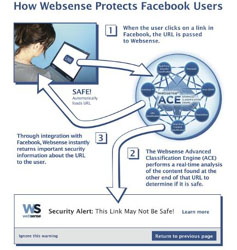Risks with Employee Use of Social Media
A new “Global Survey on Social Media Risks” released Thursday reveals a dangerous gap in corporate social media security.
It says 63 percent of more than 4,000 respondents in 12 countries said that social media in the workplace represents a serious security risk — yet only 29 percent report having the necessary security controls in place to mitigate it.
More than 50 percent of respondents report an increase in malware due to social media use.
The research, conducted by the Ponemon Institute and sponsored by content security provider Websense, Inc., is claimed to be the first study that determines what IT and security practitioners throughout the world think about the security risks that are associated with employee use of social media.
[ Also Read: 10 Things Workers Want to See on Social Media ]In a related development, Websense technology will add to Facebook’s existing protections to stop users from clicking on links without knowing the trustworthiness of the destination. (Read: Facebook Users to Enjoy Websense Security)
The survey further explains that the dynamic social web is qualitatively different from the older static web. It requires an IT security defense that goes beyond signature and fixed-policy web technologies (like antivirus and firewalls), because while they are necessary defenses, they are not sufficient.
[ Also Read: Bayer Workers Get Social with IBM Software ]And yet, while 73 percent of respondents identify secure web gateways as an important way to reduce social media threats, a full 27 percent — more than one quarter — still don’t.
For example, imagine a new link is posted to a popular social network and it directs users to a site that downloads or leads to data-stealing code via obfuscated JavaScript.
[ Also Read: Five Social Media Myths Debunked ]Organizations need security technology that can analyze links as they appear, because the link path is new and doesn’t have a recognizable signature or known payload.
New technologies like social media, cloud services, and mobility require real-time content security, which analyzes information on the fly, as it’s created and consumed, the survey suggests.
[ Also Read: 10 Reasons Why Social Media Doesn’t Help ]Even with the risks, social media presents a large business opportunity for collaboration, reduced expenses, and more efficient processes. While organizations believe that bandwidth has been diminished due to social media, companies that block social media are in danger of being left behind, the survey says.
The study surveyed 4,640 IT and IT security practitioners in Australia, Brazil, Canada, France, Germany, Hong Kong, India, Italy, Mexico, Singapore, United Kingdom, and the United States with an average of 10 years’ experience in the field.
And 54 percent are supervisors or above and 42 percent are from organizations with more than 5,000 employees. The survey findings were released Thursday, Oct.6.






